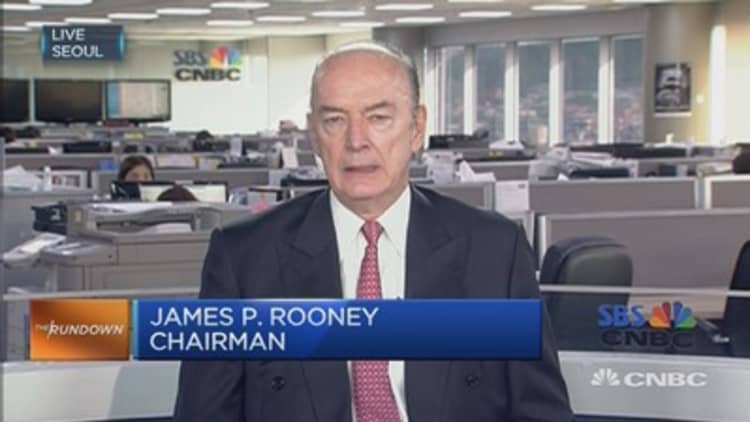
South Korea's outbreak of a deadly virus has triggered concerns over the economy, but analysts seem to be singing a different tune about the stock market, saying the recent selloff may be overdone.
"The Middle East Respiratory Syndrome (MERS) is dangerous, but I think investors are overreacting, especially people from overseas who don't know the reality in South Korea," Daewoo Securities' analyst Regina Hahm told CNBC by phone.
The benchmark Kospi index has declined 3.36 percent since the country reported its first confirmed MERS case on May 20. Selling intensified this week as public alarm grew in tandem with the rising number of confirmed cases in Asia's fourth-largest economy. On Thursday, South Korea reported 14 new diagnoses, bringing the total number of infections to 122, the highest rate outside Saudi Arabia. Nine people have died so far.
Read MoreKorea central bank walking MERS tightrope
Within the Seoul bourse, retail and tourism-related counters bore the brunt of the selloff amid concerns MERS would keep travelers, especially big-spending Chinese tourists, away from the country. Spending by mainland holidaymakers has been a key driver of domestic consumption in recent years, with visitor arrivals from China to South Korea hitting a record high of 6 million last year.
On Thursday, duty-free shop operator AK Holdings lost 1.6 percent, while rival Hotel Shilla edged up 0.5 percent. Asiana Airlines shed 0.2 percent, while Korean Air Lines ticked up 0.1 percent.
Shares of Hanatour Service plunged 2.5 percent, widening the travel agency's declines since May 20 to 14 percent.
In the consumer space, AmorePacific - the owner of several cosmetics brand favored by Chinese visitors - tanked 2.3 percent, while fellow cosmetics maker LG Household & Health Care (LG H&H) closed down 3.2 percent on Thursday. Shares of both companies are among the biggest decliners in the sector, down 11 and 17.8 percent since May 20.
However, these share price movements can be interpreted as a correction in the index's expensive stocks, according to Kim Ji-Un, equity strategist at Shinhan Investment. Furthermore,the sectors that have been hammered by the MERS scare account for only 3.4 percent of market capitalization, Kim added.
"MERS negatively affects consumer sentiment and causes small economic dents, but it is not a market-shaking variable. Despite recent declines, I do not see a loss in trading volume or downgrade in earnings forecasts. So the impact of MERS will be short-lived," he told CNBC via email.

Opportunity to buy?
The drastic price drops may offer opportunities for investors to increase their exposure, says Daewoo Securities' Hahm.
"For stocks like Hotel Shilla, Amorepacific and LG H&H, their stock prices have dropped too much and [are] not in line with fundamentals, so there's bargain in them," she told CNBC.
To be sure, Hahm notes there is the risk that if the MERS scare continues through June, it could eventually take a toll on the earnings of South Korea's tourism-related firms as the upcoming September quarter is a traditionally strong quarter for both inbound and outbound tourism in the country.
Meanwhile, there are other analysts who don't think it's time to bargain hunt just yet.
"Frankly speaking, the Kospi index has held up pretty well... still above the 2,000 mark it crossed three months ago. So at that level, I would say [the impact of MERS] has yet to filter through the market and I don't see bargains yet," said James P. Rooney, chairman of Advanced Capital Partners. He expects the tourism and retail sectors to come under more selling pressure.
"If shops remain empty, then maybe we will see further adjustments over the next few weeks which will make better entry points," Rooney added.

